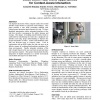Free Online Productivity Tools
i2Speak
i2Symbol
i2OCR
iTex2Img
iWeb2Print
iWeb2Shot
i2Type
iPdf2Split
iPdf2Merge
i2Bopomofo
i2Arabic
i2Style
i2Image
i2PDF
iLatex2Rtf
Sci2ools
130
click to vote
CHI
2005
ACM
2005
ACM
Smart sinks: real-world opportunities for context-aware interaction
Can implicit interaction with a computer easily drive useful interface improvements in physical world settings? This paper presents a case study presenting multiple such context-aware interaction improvements in a sink. We have identified opportunities where automated interfaces at the sink have positive consequences for safety, hygiene and ecology. The danger of scalding oneself with hot water is confronted by transforming the water into a graphical user interface and using image understanding to dispense the proper temperature of water. Audio-visual feedback at the sink can motivate users to conserve water. Used in combination with an RFID reader, the sink can serve as an effective means of verifying hand-washing compliance for clean environments. Finally, automatic actuation of the sink's height based on the user and task can prevent burns and ergonomic injuries. This project demonstrates that the integration of digital interaction in a hostile environment can facilitate and i...
CHI 2005 | Context-aware Interaction Improvements | Human Computer Interaction | Keywords Persuasive Environments | Useful Interface Improvements |
| Added | 30 Nov 2009 |
| Updated | 30 Nov 2009 |
| Type | Conference |
| Year | 2005 |
| Where | CHI |
| Authors | Leonardo Bonanni, Ernesto Arroyo, Chia-Hsun Lee, Ted Selker |
Comments (0)

